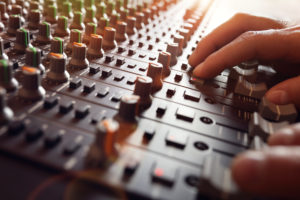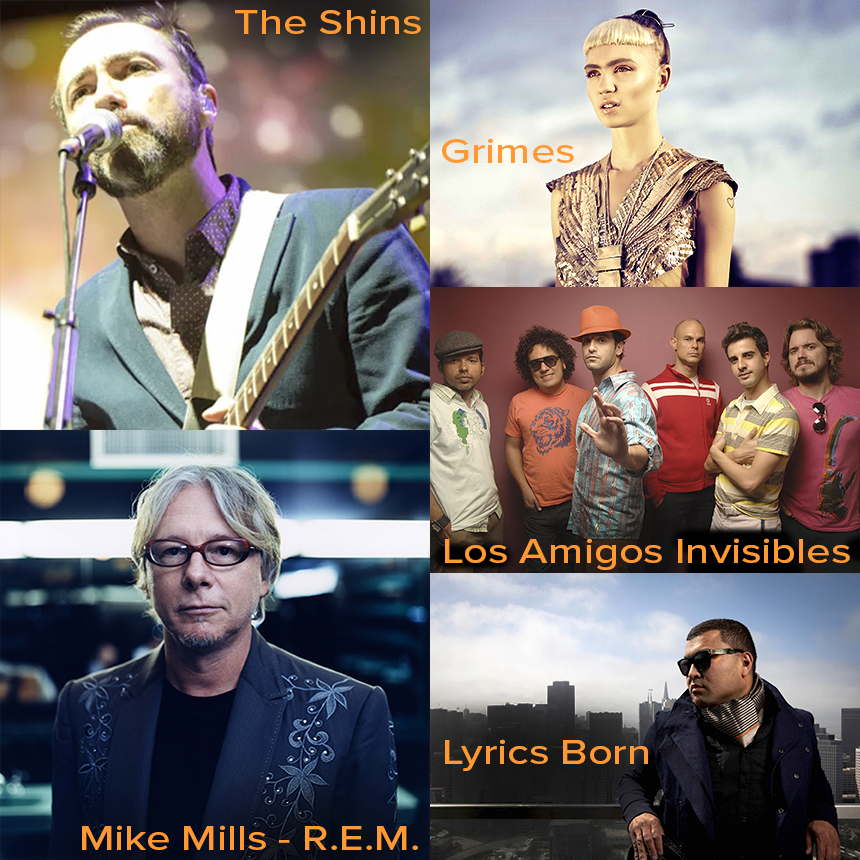For most aspiring sound engineers, their recording studio starts slowly. Some of the best sound engineers started with just a shelf of gear in their bedroom, and slowly added from there. In doing so, they’ve gone through several sets of equipment, testing each one thoroughly to see what made for the best sound at the best prices. Through their testing, they found out what makes good combinations of gear. More importantly, they understand why they work so well together.
With today’s technology, even a small bedroom studio has the potential to yield the kind of results a professional studio accomplished years ago. However, with all the new gear coming into play, and with companies continuously coming out with new equipment, how do you know what gear works the best? Of course, much of the equipment you buy depends on what you plan on producing, and what kind of audio you plan on being able to record. After all, a spoken game dialogue requires somewhat different kinds of recording and engineering equipment than a rock music track.
Well, we’ve spoken with Johannes Luley of My Sonic Temple, to get his opinion of what he considers “the best” sound recording equipment. Johannes is one of the top sound engineers in Los Angeles, and is a 20+ year expert in sound engineering. We’ve compiled some of what he considers to be the best gear you would want for your recording studio. So sit back and take a unique look into the mind of an expert sound engineer, and find out what he likes in recording equipment and, more importantly, why he likes the equipment so much.
Recording Studio Tip #1: Top Quality Doesn’t Always mean Top Price.
Our expert sound engineer gave us a great tip right at the start. “I always look for top quality first, which doesn’t necessarily always mean the most expensive gear.” And although you may not have to pay top dollar for the best gear, you certainly don’t want to skimp out on quality. According to the expert, “Your sound is only as good as the weakest link in your signal chain, so I always look for top quality. Doesn’t have to be top price, but a lot of times you just get what you pay for.”
Recording Studio Tip #2: Variety is Key
Another great tip our recording studio expert gives is: “a good variety in equipment is also important.” Those words are both wise and true. A professional recording studio accepts prospects from many different artists and genres, for use in several different mediums. A good sound engineer will ensure their recording studio can handle all different styles and types of recordings.
Recording Studio Tip #3: Soundproofing
Whether your recording studio is in a professional facility, or in the back of your closet, you need to consider its acoustics. Without proper soundproofing, you’ll hear the echoes and other reflected sounds in the room in your recording. But sound-absorbing material for your walls isn’t quite enough by itself. Soundproofing also involves optimizing your setup to ensure you not only minimize the reflected sounds, but also record as much of the natural ambiance as possible. In short, soundproofing helps you achieve higher quality recordings.
Expert Gear of Choice: A Good Computer!
Where would we ever be without this staple marvel of technology? Long gone are the days of tape editing and boxes of audio tape. A computer is probably the most important aspect of your recording studio setup. It is here where you will perform your heavy digital audio processing and editing. The computer is also the place you will want to store your digital audio files, mixes, audio loops, and more. Most computers nowadays are well equipped to handle the rigorous demands of audio processing and storage. You do not need a super-powerful, top of the line computer to do audio editing and processing.
However, there are a few musts when deciding on a computer for use in your recording studio. Having at least 8GB of RAM is a must for serious audio processing, and 16 GB is even better! Another good investment for a digital editing computer is an SSD or M.2 drive. The raw speed of an SSD is formidable in comparison to mechanical hard drive. Audio processing and editing requires a lot of reading and writing to and from the disk. Because of this, it makes sense to have the fastest one you can afford. If you are not an expert in computers, don’t be afraid to ask for help from a computer expert.
Finally, although not as important as RAM or a storage drive, your CPU should be powerful enough to handle all your audio editing and processing tasks and applications. A powerful CPU will definitely cut down on the time it takes to process large audio files. Fortunately, most modern computers contain plenty of CPU power to handle most, if not all, digital audio processing quickly and efficiently. Some older systems, however, may chug along while working on your recording.
Expert Gear of Choice: Microphones
For the best audio recordings, our expert’s top choice is Neumann Microphones. According to Johannes, “a good Neumann mic is always a good sign. You just need something like it (or better) for great vocal recordings.” What makes Neumann microphones so good for sound recording? As our expert puts it, “they are clear, silky and smooth sounding, and just lend themselves to emphasize the frequency range of most vocal performances.”
But of course, you should not just have a single microphone for all your audio recordings. It is a great idea to have a variety of tube, condenser, dynamic, and ribbon microphones, from several different brands. Other recommended microphone brands are Mojave, Royer, AEA, AKG, Coles and Manley. However, in any case, a professional sound engineer will have several on hand to use. As our expert says, “It is always a good idea to try several mics on any given voice to see which one is the best match.”
Expert Gear of Choice: Pre-amps
Just like microphones, pre-amps are something you will want to collect a variety of for your recording studio. A professional sound studio will have both tube (older technology) and solid state (newer technology) pre-amps available, to ensure the best sound quality possible. Brands like Demeter, D.W. Fearn, Manley, Tube Tech, Chandler, Millennia and Neve are all great choices for pre-amps.
Our expert also notes that “some pre-amps ‘color’ the sound of the recording, others do not.” Because of this, he recommends that “it’s ideal to have both available, depending on the task at hand.” For example, our expert sound engineer loves to use Neumann microphones with a tube pre-amp for voice recordings. For electric instruments, like an electric guitar, he will use an AEA ribbon mic into a AEA ribbon pre-amp. Acoustic instruments are recorded with an AKG C414 microphone, into a tube pre-amp.
Expert Gear of Choice: Converters
Converters are what transform analog audio into digital, and vice versa. “Very important in the digital realm is what kind of converter you use”, our expert explains. “A lot of companies use cheap components in their equipment”, which makes the sound quality suffer. Johannes uses the Burl B80 Mothership, which he considers the benchmark for top quality converters. Why? “Here at My Sonic Temple, we did A/B comparisons between RME converters (a reputable German manufacturer) and the Burl Mothership. The results were ear-opening, and definitely in favor of the Burl converters.” Other good brands our expert recommends to look out for include Lynx, SSL and Crane Song.
But what makes a converter good, versus not-so-good? “What is important in a converter is transparency or clarity” in your audio recording. “If you use top quality components you will get much more transparency.” This equates to better, less muffled sound, with a higher fidelity. “This becomes even more important when it comes to outboard summing, where your music will be converted from digital to analog and then back to digital.”
Expert Gear of Choice: Plugins
As more and more music production happens “in-the-box” (using computers and digital processing software), it is really important for most studios to own a good assortment of plug-ins used for signal processing. “It’s amazing how much bang for your buck you get, compared to the old days when all that processing power had to be purchased in the form of outboard gear,” says our Johannes. What brand does he use? “My favorite company is UAD (Universal Audio). Their stuff is pricey, but extremely solid and transparent sounding.” Of course, software brands like Celemony, Eventide, FabFilter Flux/IRCAM, Plug-in Alliance, Softube, Sonnox, Synthogy, VSL and iZotope are all worth mentioning for plug-ins.
Expert Gear of Choice: Outboard Compressors
As computers have gotten much more powerful, sound engineers are finding that they are relying less on standalone outboard compressors. They have opted instead to rely on computers to help equalize the extreme highs and lows produced in a raw audio recording. As our expert explains, “Computers and software programs (DAWs and plugins) have gotten so fast and powerful that you can easily get away without it.” Also, computers tend to be much less expensive than several of the mainstream compressors. This makes outboard gear even less desirable, especially for those just starting their recording studio.
However, for those that can afford it, one of the best compressors around is The Fairchild 670, which “is a classic from the 50’s and 60’s.” Why? According to Johannes, “you can’t get this kind of quality today. If you find one in good condition and you happen to be rich, buy it!” Good modern brands to look for are Manley, TubeTech, Shadow Hills and DW Fearns. But be forewarned that, although those units are cheaper, their costs are “still in the $5K range and up.”

Final Recording Studio Expert Tip: Learn your Gear!
In the words of our recording studio expert himself, “Of course, all of that fancy gear is worthless without an engineer/producer who knows how to make best use of it.” And he is absolutely right. One of the best things a sound engineer can do is understand how their equipment works, and how each piece works with the rest to produce the final recording.
As our expert says, “Experience is as important as adaptability in today’s fast changing music world.” So go ahead and take the time to play with all those fancy switches, buttons, sliders and knobs. The only way to truly understand your equipment is to test it out. Invite some musician friends over for a jam session in your recording studio. If you don’t know any, ask a friend to come over and record a conversation. Play with the settings and see what combinations produce a good sound. Then make it sound as strange or funny as possible. The more you adjust your gear, the more you will learn. The more you learn, the better of a recording engineer you will become!
*Special Thanks to our expert, Mr. Johannes Luley of My Sonic Temple, for his extremely helpful knowledge, wisdom, and insights into the realm of sound recording and engineering!


Comments are closed